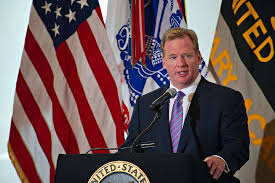
The NFL team owners meet in the offseason every year to review the previous year. In these meetings, rule changes are proposed, and the owners of the teams vote on them. Roger Goodell, the NFL’s commissioner, also gives the team owners and media a “State Of The League” address, much like the president’s State Of The Union address. In this address, the commissioner goes over the main issues around the league and offers potential solutions for them. He also discusses what’s going right with the league, and what needs to keep happening.
The 2024 NFL owners meeting has been an eventful one. There have been some major rule changes that will change the way the game is played. The most notable changes have been the elimination of the “hip-drop” tackle, the reimagining of the kickoff, the movement of the trade deadline, and the change-up with the coaches’ challenges.
The biggest and most noticeable change will be the kickoff. The kickoff model will be completely changed, and the NFL will be adopting the United Football League’s way of doing things. The new model is designed to encourage kickoff returns (rather than touchbacks) and prevent injuries. In this new setup, no one but the kicker and returner are allowed to move while the ball is in the air. In the past decades, the players could move as soon as the kicker’s foot touched the ball. They were always able to gain momentum from the 40-60-yard sprint while the ball was in the air, leading to many returners getting injured.
The kickoff setup in place right now discourages returning the ball in non-dire situations. Players don’t want to risk injuries from the fast-traveling 200-pound men barreling down on them, and most of the players would rather not return kickoffs at all.
The NFL tried to cut down on injuries last year by allowing returners to call for a “fair catch” on kickoffs. This allows the returner to signal in the air before he catches the ball. As soon as he does this, none of the players are allowed to hit him, and the ball is placed at the 25 yard-line (the same place as if it were a touchback).
Despite the benefits, these recent rule changes have made the problem of a lack of returns worse. In 2023, only 21% of all kickoffs were returned (Sports Illustrated). The kickers can simply boot the ball farther than they could in the past, so touchbacks and fair catches have made this play almost obscure. This is why the kickoffs needed a makeover, and also why the new style passed with 29 out of 32 owners approving it.
The other big change that the NFL will try out is the elimination of the hip-drop tackle. According to NFL.com, “A hip-drop tackle occurs when a defender wraps up a ball carrier and rotates or swivels his hips, unweighting himself and dropping onto ball carrier’s legs during the tackle”. The NFL is always trying to cut back on injuries, and the hip-drop tackle has been the culprit of many of them.
One of the most significant player injuries caused by the hip-drop tackle was Mark Andrews’ broken fibula. Bengals linebacker Logan Wilson used the tackle near the goal line in the first quarter of a Bengals-Ravens game in week 11 of the 2023 season. Andrews immediately started writhing on the ground in pain, and the players and training staff gathered around him. He didn’t play again for the rest of the year.
The Andrews injury wasn’t one the public could ignore. Andrews is one of the most vital cogs in the machine of the Ravens offense. His absence was certainly felt throughout the season, and when it mattered most: the playoffs. Lamar Jackson, the Ravens quarterback wasn’t able to play as well in the playoffs against the Chiefs, and part of that was certainly because he was missing his top tight end.
The close AFC Championship between the Chiefs and Ravens would have been more competitive and there would have been a more effective Ravens offense if Mark Andrews hadn’t been injured. When an already controversial rule (or lack thereof) directly affects the outcome of a game that matters, the NFL steps in.
The owners agreed to ban the hip-drop tackle, but the players weren’t all on the same page. The NFLPA showed their dismay at the rule change, asking the NFL not to ban the tackle. The defensive players already have to pay attention to avoiding other types of illegal hits, and the NFL is taking away even more breathing room and freedom for the players.
The NFL is forcing defensive players to re-learn part of the game, and is taking parts of their playing style away… again. The NFL is doing this to cut down on injuries, which is a noble cause. But the problem is that making it illegal won’t prevent it from happening. A penalty flag doesn’t do much to help a broken fibula or other injuries caused by this tackle.
Another change is that of the trade deadline being moved to after week 9. This was done because the NFL shifted to a 17-week, 18-game schedule in 2021, a group of owners found it appropriate to shift the trade deadline back 1 week. They proposed this change at the meeting and it passed soon after. This change hadn’t been brought up in the past, but the owners realized that it made sense to do it.
This change will make teams able to edit their rosters even later than before, and teams can benefit from being able to personalize and diversify their rosters for an extended period of time. Usually, the big trades are done before the season starts, but this “tool” is there for teams that need it.
The Detroit Lions proposed the last notable rule change at the owners’ meeting. The owner, Sheila Ford Hamp proposed a third coach’s challenge being allotted even with 1 successful challenge. Before, the coaches were only able to challenge a call a third time if their first 2 challenges were successful, but now the coaches get more leeway.
Ironically, the Lions’ coach Dan Campbell was 0-4 on coaches’ challenges in 2023. He was 1 of 5 coaches who didn’t have a successful challenge the whole season. For coaches like this, the rule change may not make much of a difference, but for other coaches(and games with bad officiating), this could help their teams tremendously.
Some of these rules are trial rules, meaning they aren’t guaranteed to be around for good. The 2024 season will be made more interesting by the noticeable changes, particularly the kickoffs. Some of these rules are a “wait and see” for how effective or well-received they are, and fans will be paying close attention and forming their opinions on them.



